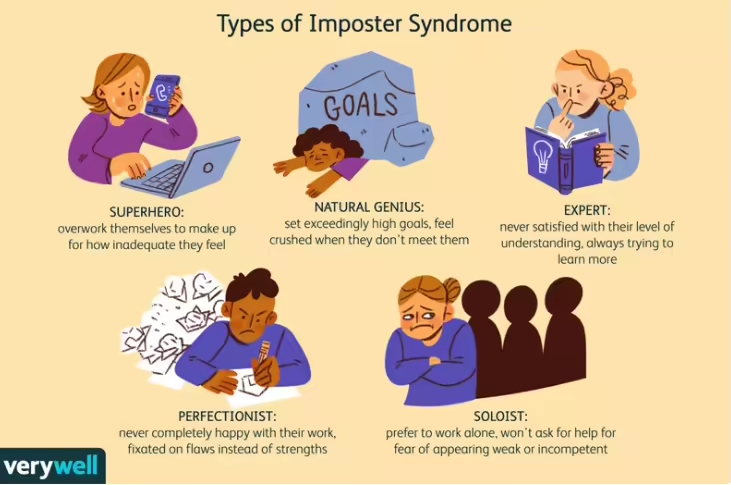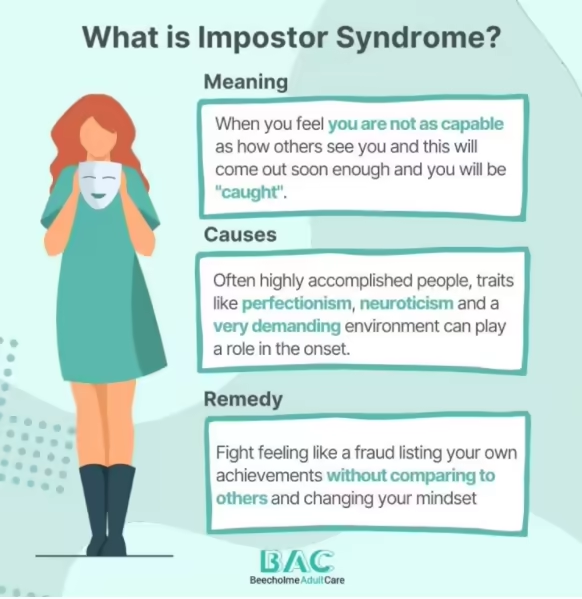Youre not alone if youve ever felt like an impostor at work, school, home, and so on. Many people have had these ideas at some point in their lives.
Definition of Imposter Syndrome
In 1970, two psychologists, Suzanna Imes and Pauline Rose Clance introduced the imposter syndrome concept. At this time, it was mainly thought to be associated with high achieving women, but more studies have shown that very little of the world population is spared.
A 2020 KPMG study revealed that 75% of the women in executive positions suffer from imposter syndrome (IS). According to a Mental Health Journal publication, the prevalence of imposter syndrome varies so widely from 9% to 82%, depending on the study population.
Imposter syndrome is a psychological disorder in which high-achieving people, despite their objective achievements, struggle to integrate their achievements and suffer from chronic self-doubt and dread of being exposed as a fraud or imposter. Individuals suffering from imposter syndrome do not attribute their success to their true competence but rather to external circumstances such as luck or assistance from others while viewing failures as proof of their professional incompetence. Simply put, imposter syndrome is when an individual does not believe that they are as good as their results are showing. People with imposter syndrome always feel as if they dont deserve to be where they are. So at any particular moment, they feel as if they will be found wanting or inadequate in their achievements. People with this psychological disorder find it hard to take compliments or to believe that they are as good as people say they are.
Research has shown that the imposter syndrome can affect anyone despite race, colour, gender, ethnicity, position, or wealth status. Research also suggests that at least 77% of all people experience this phenomenon at least once in their lifetime. In the early introduction of this phenomenon and over the years, people believed women were more affected than men, but recent studies have proven that it is merely a 50/50 chance with other researches (e.g. the Quartz publicised research) proving men to be even more affected by this phenomenon more than women.
According to Healthline, imposter syndrome, also known as perceived fraudulence, is characterised by persistent feelings of incompetence and self-doubt, despite your qualifications, experience, and achievements. Psychologists first described the syndrome in 1978. According to a 2020 study, 9% up to 82% of people experience impostor syndrome when they believe they havent earned what theyve accomplished and are a phoney (Bravata, D. M., et al., Journal of General Internal Medicine, Vol. 35, No. 4, 2020). The figures may differ depending on who takes part in the research. Impostor syndrome manifests itself as a feeling of being a fraud, a dread of being exposed, and a problem internalising ones accomplishment. Self-doubt may help people evaluate their achievements and abilities, but too much self-doubt can hurt their self-image.
This can result in imposter syndrome symptoms, influencing the following aspects of a persons life.
Performance at work
The individual may be concerned that their coworkers and managers have unrealistic expectations of them. They may believe they are unable to deliver. A persons fear of not succeeding may encourage them to hold back and avoid pursuing greater goals. This, together with the fear of making a mistake, might impact their overall job performance.
Taking up more obligations
According to the MedicalNewsToday, a study released in 2014, people with impostor syndrome may focus significantly on limited activities rather than taking on extra responsibilities that can demonstrate their competence.
They may be hesitant to take on extra responsibilities for fear of detracting from or jeopardising the quality of their current ones.
Self-doubt
For persons with imposter syndrome, success can lead to a spiral of self-doubt. Even when a person reaches a significant milestone, they may not appreciate their achievements. Rather than appreciating their accomplishments, the individual may be concerned that others would learn the "truth" about their ability.
Any acknowledgement earned-It is labelled as sympathy or pity. Even though you attribute your successes to chance, you are solely responsible for any errors you make. Even minor mistakes enhance your belief in your ineptness and inability.
Attributing success to variables beyond ones control
Impostor syndrome affects those who reject their competence. They may believe that their achievements are attributable to external sources: chance or a reliable source. When things go wrong for reasons other than the individuals control, they may blame themselves. Therefore, people with high imposter syndrome have an external locus of control mentality, meaning their achievements are attributed to external forces such as luck, bias, fate, or chance.
Burnout and job dissatisfaction
In some instances, a person may not feel adequately challenged in their work, yet the fear of failure or discovery prevents them from seeking advancement or further responsibilities. As individuals strive to overcome their feelings of inadequacy, they may become more prone to burnout.
According to the findings of a 2014 study, persons with impostor syndrome prefer to stay in their jobs because they dont feel they can perform better. Individuals may undervalue their talents or fail to see how their abilities are valued differently in other positions.
Make no attempt to obtain a promotion
Impostor syndrome can cause people to doubt their value by undervaluing their skills and abilities. They may be hesitant to ask for a promotion or increase since they do not feel deserving. According to the MedicalNewsToday, when one academic earned their appointment in the original 1978 research, they assumed there must have been a mistake in the selection process since they could not see how they could be deserving of the position.
Goal-setting and a focus on tasks
Overachievement can sometimes be caused by a fear of failure and a desire to be the best. The person may have set challenging objectives for himself and been disappointed when they could not attain them.
Imposter Syndrome Effects on Mental Health
In certain circumstances, the worry of not being good enough might lead to mental health issues. The person may experience the following:
- Anxiety
- dread of being exposed as a phoney
- depression
- irritability and a lack of self-assurance
- shame
On the other hand, experts do not consider imposter syndrome to be a mental health illness.
The Five Types of Imposter Syndrome
In her 2011 book "The Secret Thoughts of Successful Women: Why Capable People Suffer from the Impostor Syndrome and How to Thrive in the Face of It," leading imposter syndrome researcher Dr Valerie Young lists five primary sorts of imposters.
As she refers to them, these competence kinds represent ones personal views about what it is to be competent.

Heres a closer look at each personality type and how it manifests itself.
1. The Perfectionist
You put a lot of emphasis on how you do things, to the point that you expect perfection from yourself in all areas of life. You wont reach these requirements since perfection isnt always a feasible aim. You could condemn yourself for minor mistakes and feel guilty of your "failure" instead of praising the hard effort youve put in after finishing a task.
If you fear you wont accomplish anything correctly the first time, you may avoid attempting new things altogether. "Perfectionists" have incredibly high standards for themselves, and they will feel like failures even if they achieve 99% of their objectives.
2. Natural brilliance
Youve spent your life taking up new abilities with little effort and assume you should be able to grasp new information and procedures immediately. When you have a tough time, your assumption that competent individuals can manage everything easily makes you feel phoney. Therefore, when a "natural genius" struggles or works hard to complete a task, they believe they are not good enough. They are used to things coming easy to them, so when they have to work hard, their brain tells them theyre a fraud.
You may feel guilty and embarrassed if something does not come naturally to you or not achieve it on your first try.
3. The tenacious individualist (or soloist)
You feel that you should be able to take care of things independently. You believe you are unworthy if you cannot attain success on your own.
Asking for help or accepting aid when provided isnt the same as letting down your high standards. It also entails owning up to your shortcomings and confessing to failure.
4. The specialist
You must understand everything there is to know about the subject before considering your job a success. Since you believe you should know everything and have all the answers, you may feel like a phoney or a failure if you cant answer a question or learn something you didnt know before. You could wind up needing to commit extra time to your core work since you spent so much time chasing your hunt for new knowledge.
5. The Superhero
You associate competence with your capacity to achieve in every position you play, whether as a student, a friend, an employee, or a parent. Failure to meet the expectations of these positions merely demonstrates your ineptitude in your mind. To succeed, you must push yourself to the maximum in every job, using as much energy as possible.
Even putting out your best effort may not be enough to alleviate your thoughts of imposter-ship. "I should be able to accomplish more," or "This should be simpler," you might think. To prove that they are not impostors, "supermen" or "superwomen" push themselves to work harder than those around them. They have a strong desire to succeed in all parts of their lives—at work, as parents, as partners—and may get anxious if they do not achieve their goals. The extreme effort, as in "workaholism," is common among superheroes. This can result in burnout, which can harm ones physical and mental health and interpersonal connections.
Impostor syndrome is caused by a variety of factors
According to an article on time, there is no one-size-fits-all solution. According to Ervin, some specialists feel it has something to do with personality qualities like anxiety or neuroticism. In contrast, others believe it has something to do with familial or behavioural factors. Childhood experiences can have a lasting influence, such as the sensation that your grades were never high enough for your parents or that your siblings outperformed you in particular areas. "People frequently internalise these ideas: I need to succeed to be appreciated or likeable," Ervin explains. "It becomes a self-fulfilling prophecy."
Imposter syndrome is mostly caused by personality factors. Self-efficacy, perfectionism, and neuroticism are all issues faced by those who suffer from them. Competitive circumstances can also establish the foundation for future success. Many persons who later acquire emotions of impostorism, for example, were subjected to heavy scholastic pressure from their parents as children.
Impostor syndrome may be defined as a sort of humiliation characterised by feelings of inadequacy or "not good enough." Impostor syndrome is a sort of humiliation in educational or professional contexts when a person does not believe they are clever or skilful enough to succeed. People who suffer from imposter syndrome believe that others have exaggerated their talents and must keep pretending to maintain their reputation.
While many individuals rely on time, experience, and accomplishment to create confidence in their careers, those with imposter syndrome may not be able to do so. Working hard to look confident and capable while privately feeling the reverse causes impostors a lot of stress and worry, making them more sensitive to anxiety, depression, professional burnout, and low self-esteem. People with this problem might feel even more nervous, apprehensive, and dishonest when they succeed since they tend to discount their accomplishments.
- Impostor Syndrome and Childhood Experiences
Social conditioning occurs at a young age, and some research suggests that early childhood interactions with family may play a role in the development of imposter syndrome. Children who had to undertake parental tasks and obligations at an early age and children who did not have a solid and secure link with their parents have been demonstrated to be more prone to imposter syndrome. Impostor syndrome can be exacerbated by a lack of positive reinforcement and praise in childhood, leading to youngsters forming harmful attitudes about their abilities.
- Anxiety in Social Situations
Impostor syndrome and social anxiety may be linked. In social or performance contexts, a person with Social anxiety disorder (SAD) may feel like they dont belong. You may be discussing with someone and fear that they will notice your social ineptness. You could be giving a presentation and feel compelled to get through it quickly before anyone sees you dont belong there.
Imposter syndrome leads persons who are generally non-worried to become anxious when they are in circumstances where they feel inadequate. While social anxiety symptoms might exacerbate emotions of impostor syndrome, this does not entail that everyone who has imposter syndrome also has social anxiety or vice versa. People who do not suffer from social anxiety may experience a lack of confidence and competence.
- Personality
An increased incidence of impostor syndrome has also been related to certain personality traits. The following are some attributes or characteristics that might play a role:
Low self-efficacy: Your conviction in your capacity to achieve in any given scenario is referred to as self-efficacy. Self-efficacy, a term coined by Albert Bandura, denotes a persons belief in their ability to carry out the actions required to achieve specified performance goals.
Perfectionism: Impostor syndrome is exacerbated by perfectionism. You may believe that there is a flawless "script" for discussions and that you can never say something inappropriate. You may find it difficult to seek help from others and may postpone due to your high expectations.
Neuroticism: is one of the five major personality traits that has been associated with increased levels of anxiety, insecurity, tension, and guilt.
Impostor Syndrome: How to Overcome It
Although there is no particular therapy for impostor syndrome, persons concerned about its influence on their lives should seek support from a mental health expert. The actions below can also help a person manage and overcome impostor syndrome-related feelings of inadequacy.
Talk about it
Sharing sentiments with a trustworthy colleague, friend, or family member or receiving feedback can help build a more realistic view of their talents and competence.
Seek professionals
According to Trusted Source, many persons with imposter syndrome believe that they are the only ones who experience these sentiments, which leads to isolation.
By talking to a mental health specialist, a person may pinpoint the source of their feelings, allowing them to address the root problems.
Recognise the warning signs
Knowing what impostor syndrome is and why it occurs can help people recognise the signs and develop solutions to their worries.
Accept the fact that perfection is unattainable
A persons strengths and faults must be accepted to have a healthy sense of self-esteem and self-worth. Nobody is flawless, and errors are unavoidable in life. Accepting that things go wrong from Time to Time helps boost resilience and mental health.
Negative thoughts should be challenged
Impostor syndrome can be overcome by replacing negative ideas with good ones.
Imposter Syndrome Symptoms
VerywellMind notes that the impostor syndrome is a regular occurrence that is not recognised by the Diagnostic and Statistical Manual of Mental Disorders (DSM-5). According to estimates, 70% of people will experience at least one episode of this condition in their lifetime.
Ask yourself the following questions if you suspect you have impostor syndrome:
- Do you obsess about even minor errors or shortcomings in your work?
- Do you think your success is due to chance or other factors?
- Are you easily offended, even if its helpful criticism?
- Do you ever get the feeling that youll be exposed as a liar?
- Do you minimise your knowledge, even in areas where you are superior to others?
Imposter syndrome can manifest itself in various ways, depending on the person who suffers from it. Imposter symptoms can manifest in a variety of ways.
- Feeling incompetent despite demonstrating competency
- Fear of not meeting another persons expectations
- Feeling as if past successes and hard work were only due to luck
- Feeling incapable of performing at the same level every time
- Feeling uncomfortable with getting recognition or congratulations
- Feeling disappointed over current accomplishments
- Feeling doubtful of successes
- Feeling constant preoccupation Stressed, nervous, or sad as a result of feelings of inadequacy
Imposter syndrome can lead to the development of various mental health issues resulting from frequent feelings of inadequacy. Negative sentiments, for example, might lead to worry or despair, which is linked to impostor syndrome.

Kelin Zvomuya is a consultant at Industrial Psychology Consultants (Pvt) Ltd a management and human resources consulting firm.
Phone +263 4 481946-48/481950/2900276/2900966
Cell number +263 785419889
Email: kelin@ipcconsultants.com or visit our website at www.ipcconsultants.com

